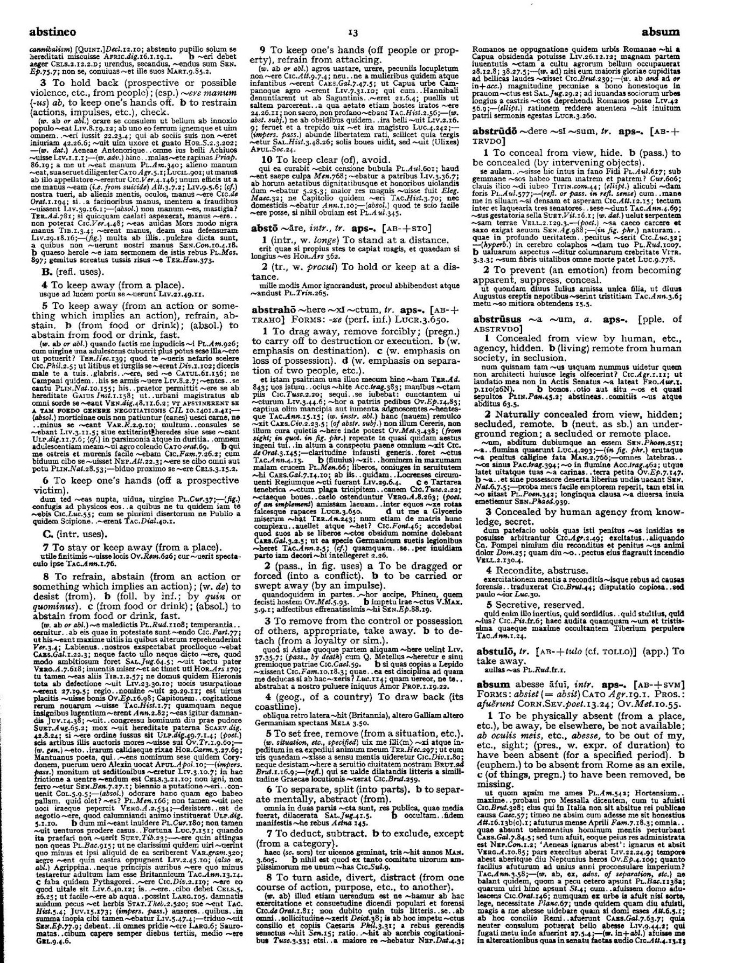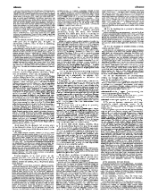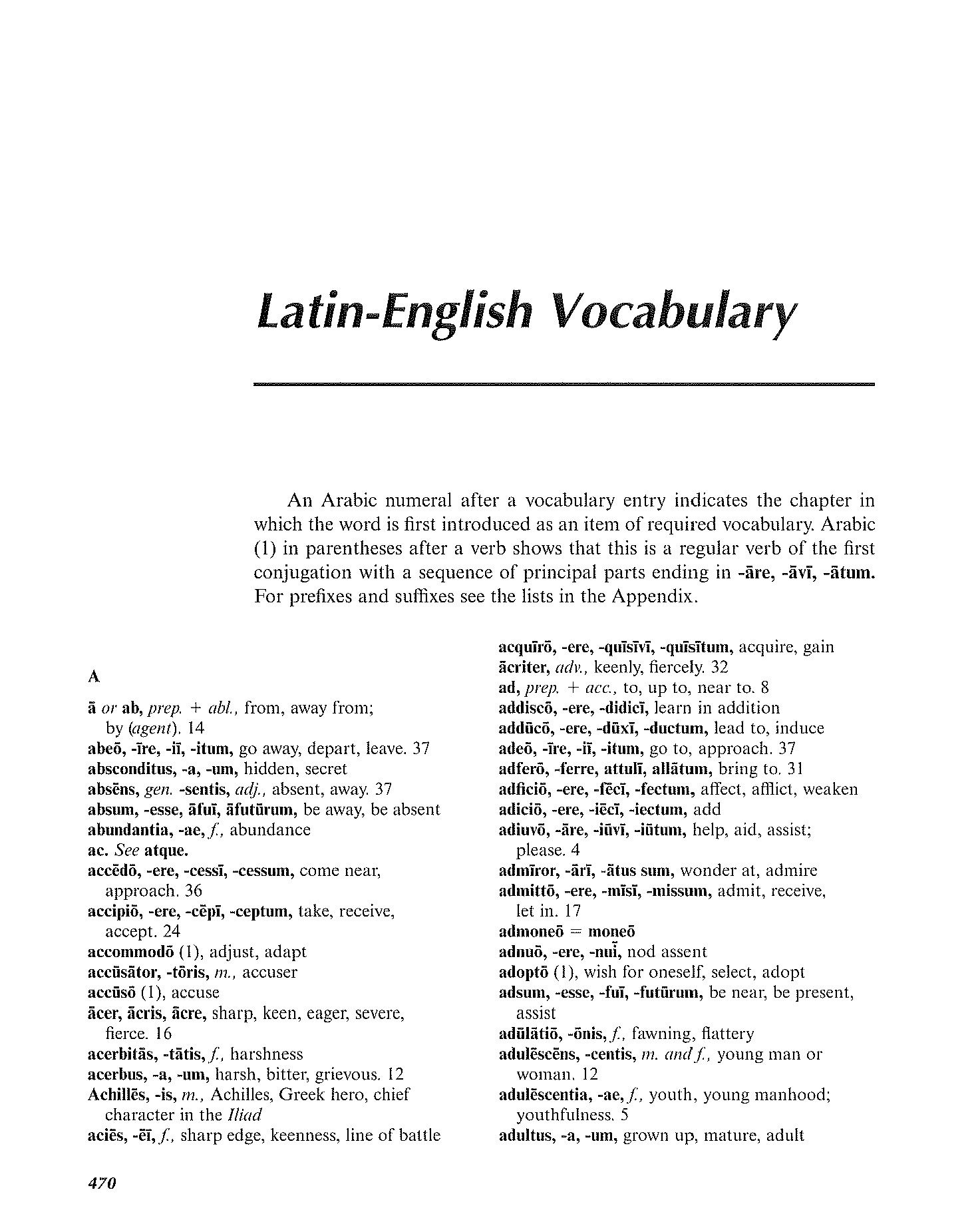
page_listing.tpl
page_subListingDetails.tpl
sub_listingDetails_style1.tpl
sub_listingDetails.title.tpl
abesse to be absent
abesse is a Latin Verb that primarily means to be absent.
Definitions for abesse
Wheelock's Latin
Verb
- 1
be away, be absent
Oxford Latin Dictionary
Verb
- 1
To be physically absent (from a place, etc.), to be away, be elsewhere, be not available; ab oculis meis, etc., abesse, to be out of my, etc., sight; (pres. w. expr. of duration) to have been absent (for a specified period). (b) (euphem.) to be absent from Rome as an exile. (c) (of things, pregn.) to have been removed, be missing.
- 2
To absent oneself (from), fail or refuse to take part (in) or appear (at). (b) (spec., of advocates, helpers, etc.) to fail in assisting, not to be present.
- 3
To be (a specified distance) away, be distant. (a) (with longe, procul, and sim.). (b) (w. acc. of distance). (c) (w. abl. of distance).
- 4
(of time) To be distant; (of events, etc.) to be distant in time. (b) (of persons, etc.) to be distant in time (a specified amount from a date or period).
- 5
(also impers., or w. neut. pron.; w. ab, procul and abl., acc. and inf., ab eo..ut or ut alone) To be removed or distant (from a condition, course of action, etc.). (b) (procul) absit, God forbid!
Sentences with abesse
Latin to English
Cum abero, vos omnes tristes eritis.Compare When I am absent, you will all be sad.
Cur Brutus absum?Compare Why was Brutus absent?
Proficiscor in castra, a qui absum biduum.Compare I set out for the camp, from which I was absent a two days' journey.
Conjugation table for abesse
Cactus2000
| ACTIVE | |
| Indicative present | Indicative imperfect |
| absum abes abest absumus abestis absunt | aberam aberās aberat aberāmus aberātis aberant |
| Indicative perfect | Indicative pluperfect |
| āfuī āfuistī āfuit āfuimus āfuistis āfuērunt / āfuēre | āfueram āfuerās āfuerat āfuerāmus āfuerātis āfuerant |
| Indicative future | Indicative future perfect |
| aberō aberis aberit aberimus aberitis aberunt | āfuerō āfueris āfuerit āfuerimus āfueritis āfuerint |
| Subjunctive present | Subjunctive imperfect |
| absim / abfuam absīs / abfuas absit / abfuat absīmus absītis absint / abfuant | abessem / abforem abessēs / abforēs abesset / abforet abessēmus abessētis abessent / abforent |
| Subjunctive perfect | Subjunctive pluperfect |
| āfuerim āfueris āfuerit āfuerimus āfueritis āfuerint | āfuissem āfuissēs āfuisset āfuissēmus āfuissētis āfuissent |
Infinitive present abesse Infinitive perfect āfuisse Infinitive future abfutūrum esse | Imperative present abes abeste Imperative future abestō abestō abestōte absuntō |
| PARTICIPLE | ||
| Participle present active | ||
| absēns | absentēs | |
| absēns | absentēs | |
| absēns | absentēs | |
| absēns | absentēs | |
| absēns | absentēs | |
| Participle future active | ||
| abfutūrus | abfutūrī | |
| abfutūrus | abfutūrī | |
| abfutūrus | abfutūrī | |
| abfutūrus | abfutūrī | |
| abfutūrus | abfutūrī | |
| Participle perfect passive | ||
| - | - | |
| - | - | |
| - | - | |
| - | - | |
| - | - | |
| Gerundive | ||
| - | - | |
| - | - | |
| - | - | |
| - | - | |
| - | - | |
| Gerund | Supine | |
| - | - | |
| - | - | |
| - | ||
| - | ||
| - | ||
| PARTICIPLE | ||
| Participle present active | ||
| Nom. | absēns | absentēs |
| Gen. | absentis | absentium |
| Dat. | absentī | absentibus |
| Acc. | absentem | absentēs |
| Abl. | absente | absentibus |
| Participle future active | ||
| Nom. | abfutūrus | abfutūrī |
| Gen. | abfutūrī | abfutūrōrum |
| Dat. | abfutūrō | abfutūrīs |
| Acc. | abfutūrum | abfutūrōs |
| Abl. | abfutūrō | abfutūrīs |
| Participle perfect passive | ||
| Nom. | - | - |
| Gen. | - | - |
| Dat. | - | - |
| Acc. | - | - |
| Abl. | - | - |
| Gerundive | ||
| Nom. | - | - |
| Gen. | - | - |
| Dat. | - | - |
| Acc. | - | - |
| Abl. | - | - |
| Gerund | Supine | |
| Nom. | - | - |
| Gen. | - | - |
| Dat. | - | |
| Acc. | - | |
| Abl. | - | |
Data sources
Notes
- Definitions
- Frederick M. Wheelock, Wheelock's Latin, 6th ed., rev. Richard A. LaFleur (New York, NY: HarperCollins Publishers, 2005): 470.
- P. G. W. Glare, Oxford Latin Dictionary, Vols. 1-8 (Oxford: Clarendon Press, 1982): 13.
- Word frequencies
- Christopher Francese, "Latin Core Vocabulary," Dickinson College Commentaries, last modified 2014, http://dcc.dickinson.edu.
- Paul B. Diederich, The Frequency of Latin Words and Their Endings, PhD diss., (Columbia University, 1939).
- Louis Delatte, Suzanne Govaerts, Joseph Denooz, and Etienne Evrard, Dictionnaire fréquentiel et index inverse de la langue latine [Frequency Dictionary and Inverse Index of the Latin Language] (Liège, Belgium: Laboratoire d'analyse statistique des langues anciennes de l'Université de Liège [L.A.S.L.A.], 1981): 122.
Bibliography
Allen, Joseph H. Allen and Greenough's New Latin Grammar for Schools and Colleges: Founded on Comparative Grammar. Edited by James B. Greenough, George L. Kittredge, Albert A. Howard, and Benjamin L. D'Ooge. Boston, MA: Ginn & Company, 1903.
Crystal, David. A Dictionary of Linguistics and Phonetics. 6th ed. Oxford, UK: Blackwell Publishing, 2008.
Delatte, Louis, Suzanne Govaerts, Joseph Denooz, and Etienne Evrard. Dictionnaire fréquentiel et index inverse de la langue latine [Frequency Dictionary and Inverse Index of the Latin Language]. Liège, Belgium: Laboratoire d'analyse statistique des langues anciennes de l'Université de Liège (L.A.S.L.A.), 1981.
Diederich, Paul B. The Frequency of Latin Words and Their Endings. PhD diss., Columbia University, 1939.
Francese, Christopher. "Latin Core Vocabulary." Dickinson College Commentaries. Last modified 2014. http://dcc.dickinson.edu/latin-vocabulary-list.
Gildersleeve, Basil L., and Gonzales Lodge. Gildersleeve's Latin Grammar: Third Edition, Revised, and Enlarged. 3rd ed. London, England: Macmillan and Co., 1903.
Glare, Peter G.W. Oxford Latin Dictionary. Vols. 1-8. Oxford, England: Clarendon Press, 1982.
Krüger, Bernd. "Latin Conjugation Tables." Cactus2000. Accessed May 5, 2023. https://latin.cactus2000.de/index.en.php.
Pierson, Nick. "Sound of Text." Accessed October 26, 2019. https://soundoftext.com.
Wheelock, Frederick M. Wheelock's Latin. 6th ed. Revised by Richard A. LaFleur. New York, NY: HarperCollins Publishers, 2005.
Wiktionary Contributors. "Victionarium." Wikimedia Foundation, Inc. Updated March 18, 2019. https://la.wiktionary.org/wiki/Victionarium:Pagina_prima.
Citation
Chicago (17th ed.)
Allo Contributors. "absum, abesse, āfuī, abfutūrum (v.) - Latin Word Definition." Allo Latin Dictionary. Last modified . Accessed February 19, 2026. http://ancientlanguages.org/latin/dictionary/absum-abesse-afui-abfuturum.
Entry created on . Last updated on .








